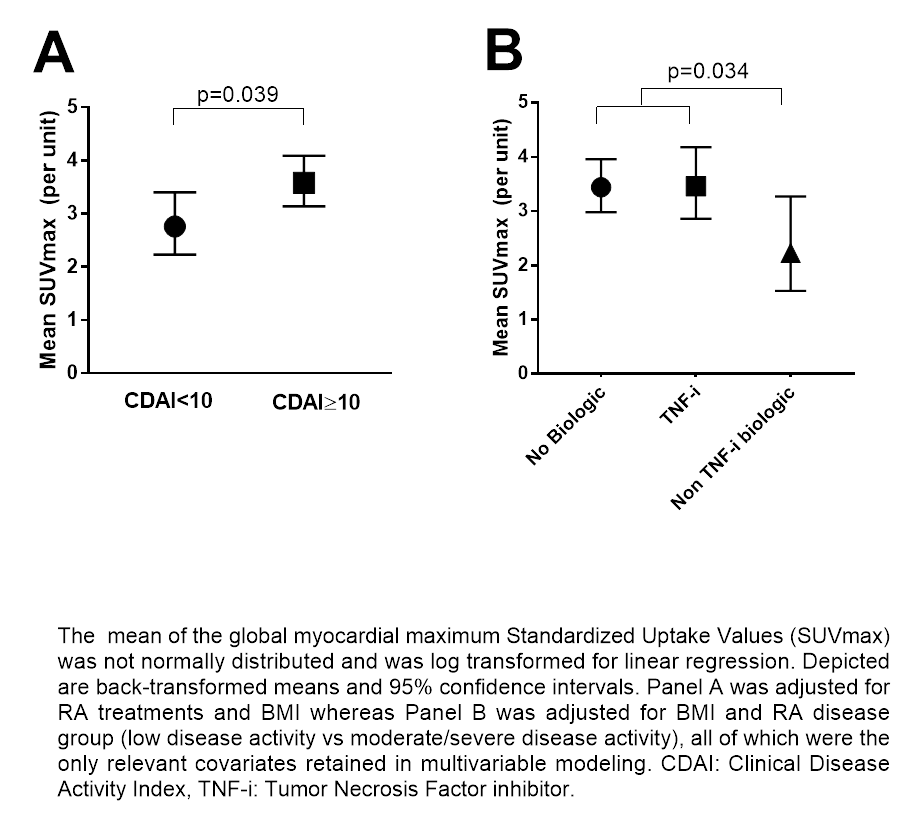Session Information
Date: Monday, November 14, 2016
Title: Rheumatoid Arthritis – Clinical Aspects - Poster II: Co-morbidities and Complications
Session Type: ACR Poster Session B
Session Time: 9:00AM-11:00AM
Background/Purpose: RA patients are at increased risk for developing heart failure (HF) even after controlling for coronary artery disease (CAD), indicating that factors other than flow-limiting CAD contribute to HF in RA. Chronic myocarditis may be one mechanism that contributes to HF in RA. We investigated the prevalence of myocardial inflammation in RA patients without known cardiovascular disease (CVD) compared to non-RA controls, and evaluated its association in the RA group with disease characteristics.
Methods: RA patients without prior CVD events underwent a cardiac [18F-fluorodeoxyglucose (FDG)] positron emission-computed tomography (FDG PET-CT). A small sample of non-RA controls frequency matched on age and gender were also enrolled. Participants also underwent 3-D echocardiography to assess left ventricular (LV) mass, volumes, and systolic and diastolic function. The mean maximal standardized uptake value (SUVmax) for myocardial FDG uptake, was compared according to disease status. Generalized linear models were used to explore the associations of SUVmax with RA patient characteristics and measures of LV structure and function.
Results: A total of 118 RA patients [mean age=55 years, 81% Female, 37% non-Hispanic White, 44% Hispanic, mean BMI=28.5, median RA duration=7 years, 76% RF or anti-CCP positive, mean DAS28=3.78, CDAI was < 10 (low disease activity) in 28%] and 13 controls were scanned. Biologics were used in 45 (38%), primarily TNF inhibitors (TNFi; n=34 (29%)]. Median SUVmax was 12% higher in RA vs. controls (2.9 vs. 2.6 units; p=0.047). In univariate analyses, higher BMI and having a moderate/severe disease activity (CDAI>10) were positively associated with SUVmax in the RA group. After adjusting for BMI and RA treatment, mean SUVmax was 30% higher for those with moderate/severe disease activity (CDAI
Conclusion: In patients with RA, moderate/high disease activity was associated with elevated levels of myocardial inflammation, while treatment with non-TNFi biologic DMARDs was associated with lower level. Longitudinal studies are needed to assess whether chronic myocarditis is a risk factor for HF in RA, and whether treatment of articular disease activity reduces myocardial inflammation and HF risk.
To cite this abstract in AMA style:
Amigues I, Giles JT, Zartoshti A, Morgenstern R, Flores R, Bokhari S, Bathon J. Moderate to Severe Disease Activity in Rheumatoid Arthritis Is Associated with Myocardial 18f-Fluorodeoxyglucose (18F-FDG) Uptake [abstract]. Arthritis Rheumatol. 2016; 68 (suppl 10). https://acrabstracts.org/abstract/moderate-to-severe-disease-activity-in-rheumatoid-arthritis-is-associated-with-myocardial-18f-fluorodeoxyglucose-18f-fdg-uptake/. Accessed .« Back to 2016 ACR/ARHP Annual Meeting
ACR Meeting Abstracts - https://acrabstracts.org/abstract/moderate-to-severe-disease-activity-in-rheumatoid-arthritis-is-associated-with-myocardial-18f-fluorodeoxyglucose-18f-fdg-uptake/

